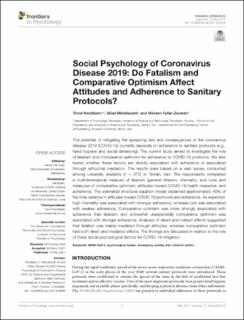| dc.contributor.author | Nordfjærn, Trond | |
| dc.contributor.author | Mehdizadeh, Milad | |
| dc.contributor.author | Zavareh, Mohsen | |
| dc.date.accessioned | 2022-09-20T07:28:51Z | |
| dc.date.available | 2022-09-20T07:28:51Z | |
| dc.date.created | 2021-03-30T17:42:22Z | |
| dc.date.issued | 2021 | |
| dc.identifier.citation | Frontiers in Psychology. 2021, 12 . | en_US |
| dc.identifier.issn | 1664-1078 | |
| dc.identifier.uri | https://hdl.handle.net/11250/3019017 | |
| dc.description.abstract | The potential of mitigating the spreading rate and consequences of the coronavirus disease 2019 (COVID-19) currently depends on adherence to sanitary protocols (e.g., hand hygiene and social distancing). The current study aimed to investigate the role of fatalism and comparative optimism for adherence to COVID-19 protocols. We also tested whether these factors are directly associated with adherence or associated through attitudinal mediation. The results were based on a web survey conducted among university students (n = 370) in Tehran, Iran. The respondents completed a multidimensional measure of fatalism (general fatalism, internality, and luck) and measures of comparative optimism, attitudes toward COVID-19 health measures, and adherence. The estimated structural equation model explained approximately 40% of the total variance in attitudes toward COVID-19 protocols and adherence. As expected, high internality was associated with stronger adherence, whereas luck was associated with weaker adherence. Comparative optimism was more strongly associated with adherence than fatalism, and somewhat unexpectedly comparative optimism was associated with stronger adherence. Analyses of direct and indirect effects suggested that fatalism was mainly mediated through attitudes, whereas comparative optimism had both direct and mediated effects. The findings are discussed in relation to the role of these social psychological factors for COVID-19 mitigation. | en_US |
| dc.language.iso | eng | en_US |
| dc.publisher | Frontiers Media | en_US |
| dc.rights | Navngivelse 4.0 Internasjonal | * |
| dc.rights.uri | http://creativecommons.org/licenses/by/4.0/deed.no | * |
| dc.title | Social psychology of Coronavirus disease 2019: Do fatalism and comparative optimism affect attitudes and adherence to sanitary protocols? | en_US |
| dc.title.alternative | Social psychology of Coronavirus disease 2019: Do fatalism and comparative optimism affect attitudes and adherence to sanitary protocols? | en_US |
| dc.type | Peer reviewed | en_US |
| dc.type | Journal article | en_US |
| dc.description.version | publishedVersion | en_US |
| dc.source.pagenumber | 9 | en_US |
| dc.source.volume | 12 | en_US |
| dc.source.journal | Frontiers in Psychology | en_US |
| dc.identifier.doi | 10.3389/fpsyg.2021.623005 | |
| dc.identifier.cristin | 1901758 | |
| cristin.ispublished | true | |
| cristin.fulltext | original | |
| cristin.qualitycode | 1 | |

